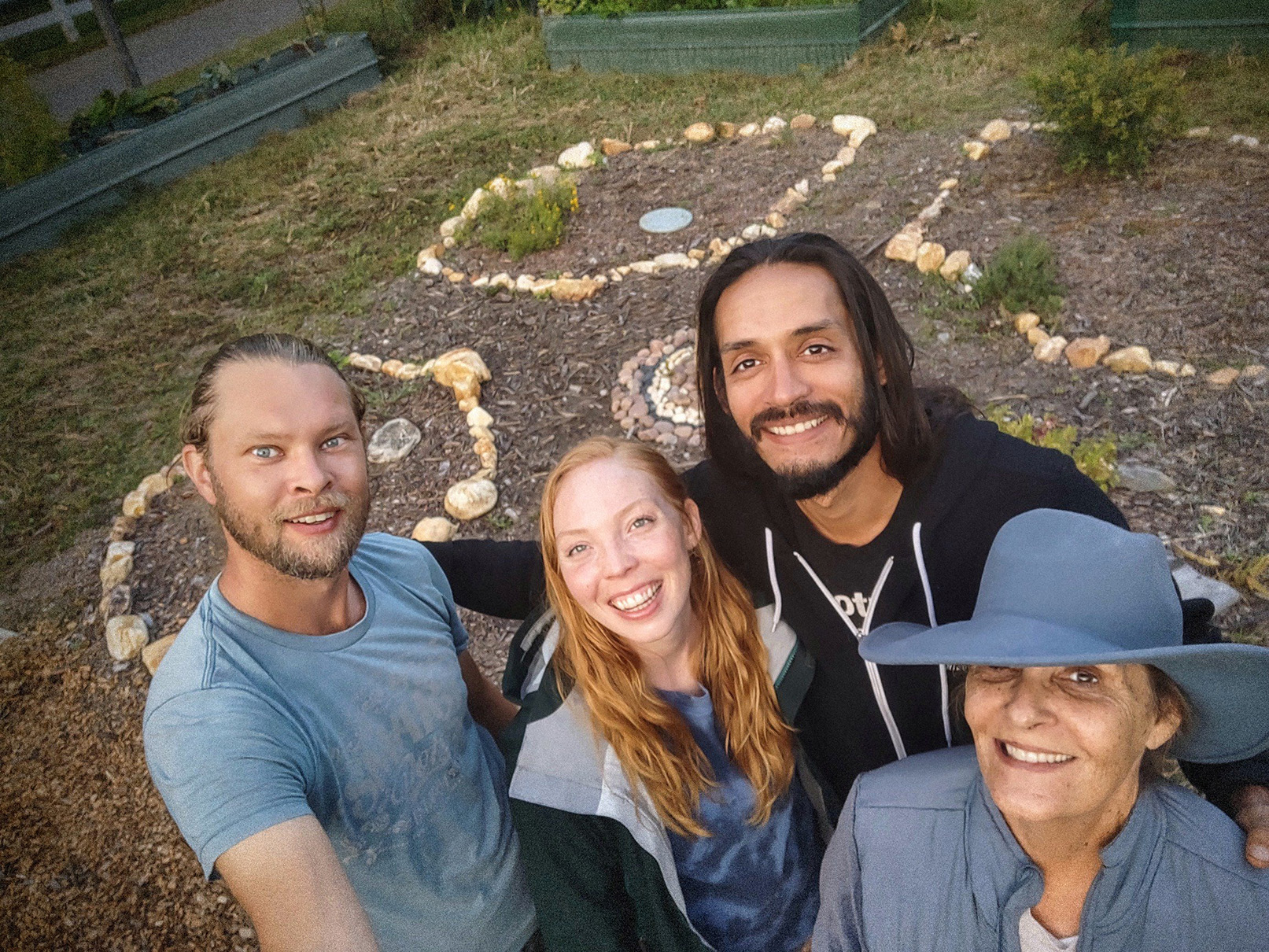
Today’s blog post is a conversation with one of our suppliers. We thought you’d enjoy hearing their story as much as we enjoy working with them.
Please introduce yourselves.
Resting Point Farms is a small heritage farm, in WNC, just beyond downtown Asheville’s edge of the Blue Ridge Mountains of the Southeast United States. We’re spirited by Jesse and “Sweet Dee”, partners in farming and in life, who provide care for this land that has been in the family for 20 years. We’re helping our community grow many, many mushrooms, practice permaculture, ethics, ecosystem stewardship, and kindness. Our band of farmers includes, climbing arborist Travis Hansen, our tight-knit volunteer group, and above all else, Kela Cannon Cerrato the visionary and lifebreath.
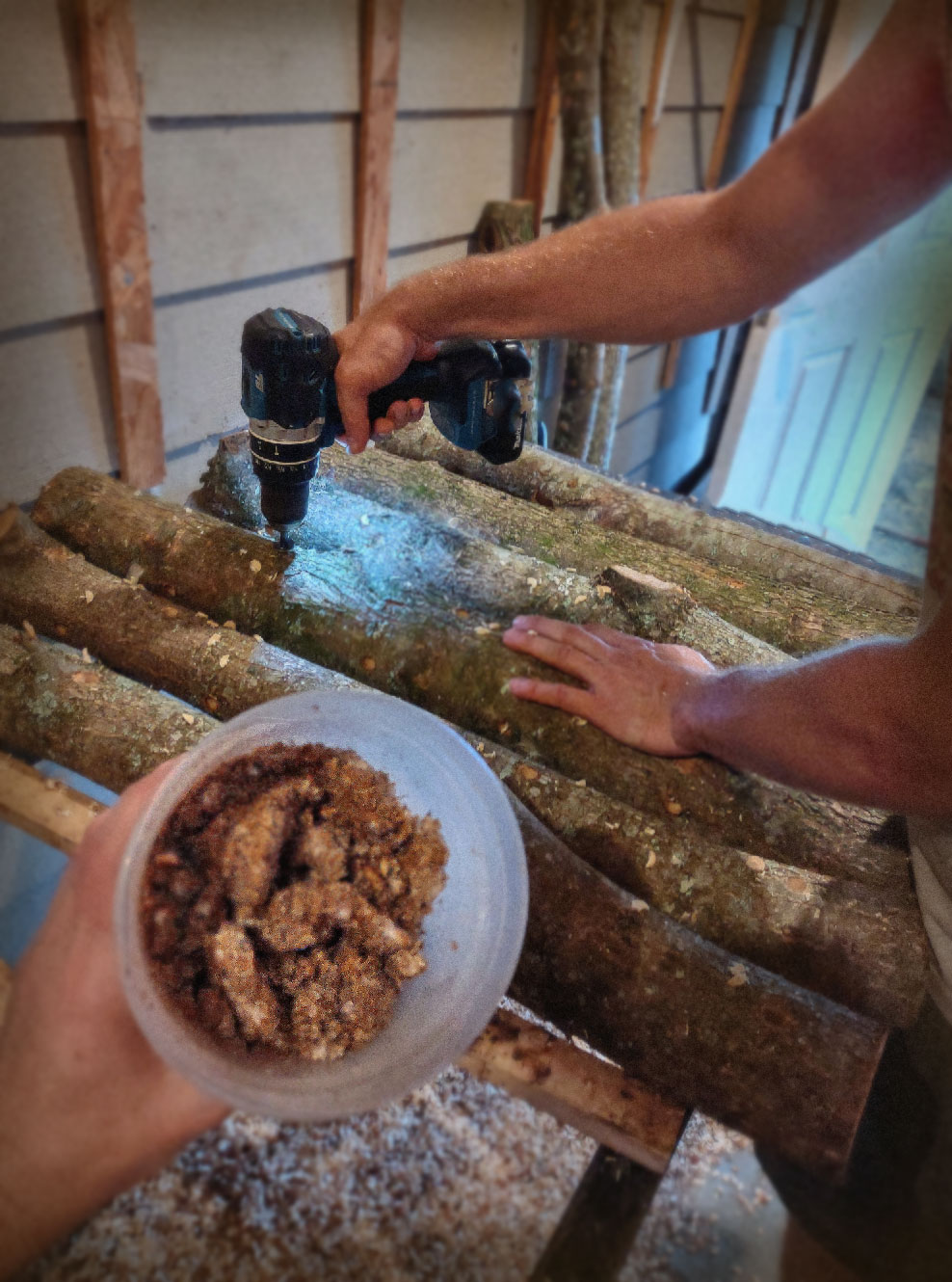
What is your connection to Fifth Season Gardening Co.?
Today, we make gourmet and medicinal mushroom logs for Fifth Season’s garden centers and online shop.
But, there’s more to the story. I (Jesse) worked in the Asheville store for 3 years before choosing to focus full time on finding my place in the farming community. My favorite part of the job was sharing knowledge with customers, and it was definitely a two-way street! Long-time readers may remember a blog post I wrote about Cultivating Mushrooms at Home.
These interactions were a catalyst for finding the confidence, strength, and support to forge a new path. We transitioned into helping the community become knowledgeable and proficient with a beginner/intermediate tech farm style of mushroom cultivation. In that way, people can easily replicate methods at their home. When I started this journey, I would spend many hours in a lab environment working on sterile propagation. These days, I focus mainly on farm application and low-cost mushroom techniques that are easily repeatable. We myceliated outwards!
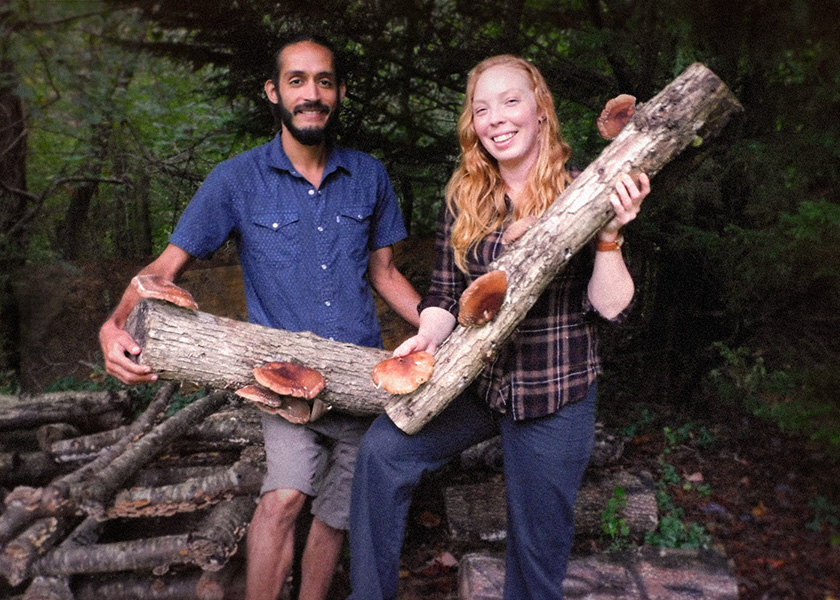
We’ll come back to mushroom logs in a bit. Please tell us more about Resting Point Farms.
Resting Point is a sweet vision coming together: we conserve and care for nature’s creatures and wilderness on 2 acres of land. Jesse’s mother, Kela, imagined a place, with everything anyone would need to live a peaceful, restful life – endless sky, forest canopy, flowing water source, land space, arm’s length from downtown culture. This vision is flushing now, as a site-specific farm focused on people, plants, and mushrooms.
What happens at Resting Point Farms?
We grow, we raise, we educate, we make! We’re caring for our chicken flock, the forest, creek, meadows, and community.
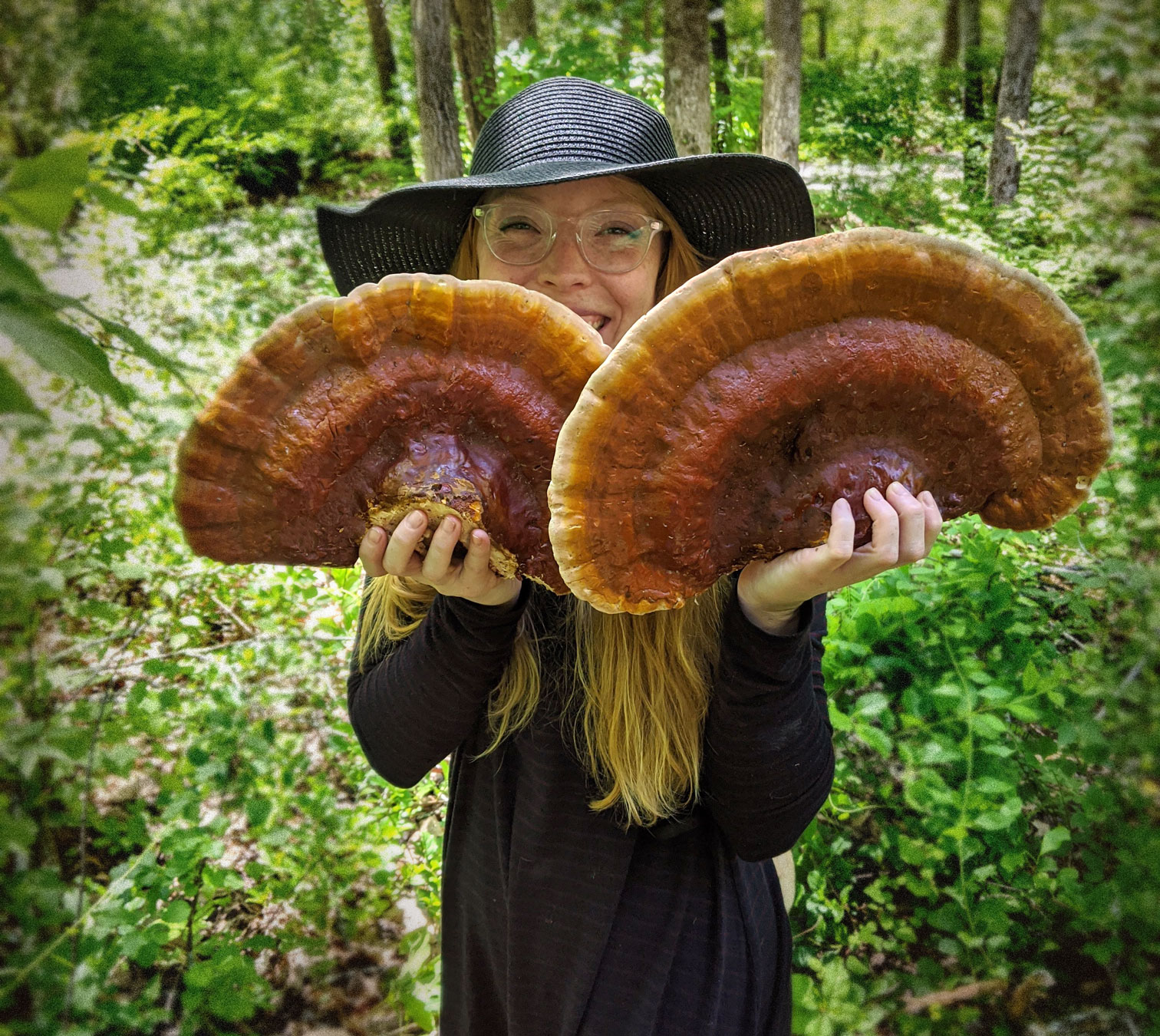
That is a lot! What are your backgrounds and how do that relate to your work at Resting Point Farms?
I (Jesse) separated from my family land to study molecular and cellular biology, only to return years later with the eagerness to continue my practical farm education and apply the science gained to improve the property. I’ve gained much insight and admiration for Wild Abundance Permaculture School. Much of what I learned, paved the way for how I wanted to integrate community, science, education, and permaculture. Each experience built my knowledge and influenced the evolution of the vision for Resting Point Farms.
I (Sweet Dee) continue a lineage of educators, applied artists, reverends, and farmers. Supporting the crux, I’m lifted in the happiness of simple farming.
What do you see as the future of Resting Point Farms?
We see expansions in our Research, Cultivation, and Residency Programs. Our Residency Program provides an intensive educational experience, in addition to a safe home environment. Combining affordable housing and work-trade opportunity, our goal is to create a regenerative atmosphere that encourages creativity and innovation.
By encouraging our landmates to pursue their own passions and skills, we aim to integrate the interdisciplinary ability of residents into our working model. Not everyone has a background in Permaculture or Molecular Biology, but we all have valuable insights into how we can elevate community and provide food security, all the while improving the world around us.
Ok, back to mushroom logs. What tips can you provide for our readers?
Mushroom logs are a lot of fun and can be highly productive for several years. By seeking renewable waste streams, we can add value to the resources that are most available. Once you have your mushroom logs, the best way to care for them is to keep logs out of direct sunlight, too much sun will dry out your logs and slow down the growth of the mushroom spawn. We find it beneficial to keep the logs in a shaded space that is close to a water source. It’s important to drench the logs upon installation and to periodically water the logs if they start to feel light (get a feel for how heavy they are when soaked as a frame of reference). Ideally, the space to store logs should be easily accessible/observable after a heavy rain. It’s easy to forget about your logs, as they can take over a year before they start producing. Don’t forget! Set a weekly calendar reminder for the year after the date on the tag, and then check them daily after heavy rain. When they take charge and begin flushing often, you will jump with joy with each new flush!
Determine the best area to place your mushroom logs by… shady, moist, easily seen, area.
Like everything else in nature, expect some variation in productivity. That said, there are some rules of thumb for how the different varieties will produce:
- Oyster varieties tend to be the fastest to fruit. Sometimes they will do so within the first six months. Be sure to keep an eye out so that you get your harvest before bugs do on this variety!
- Shiitake logs can take a while to fruit (12-24 months isn’t unusual). But once they get going, they are highly productive and under less pressure from pests than are oysters.
- Lion’s Mane is similar to shiitake in terms of wait time. Also, the first fruiting is likely to be modest. Be patient and subsequent fruiting will be larger and larger. These might be the most delicious cultivated mushroom species, and they have a texture similar to that of lobster. So, they’re worth the wait!
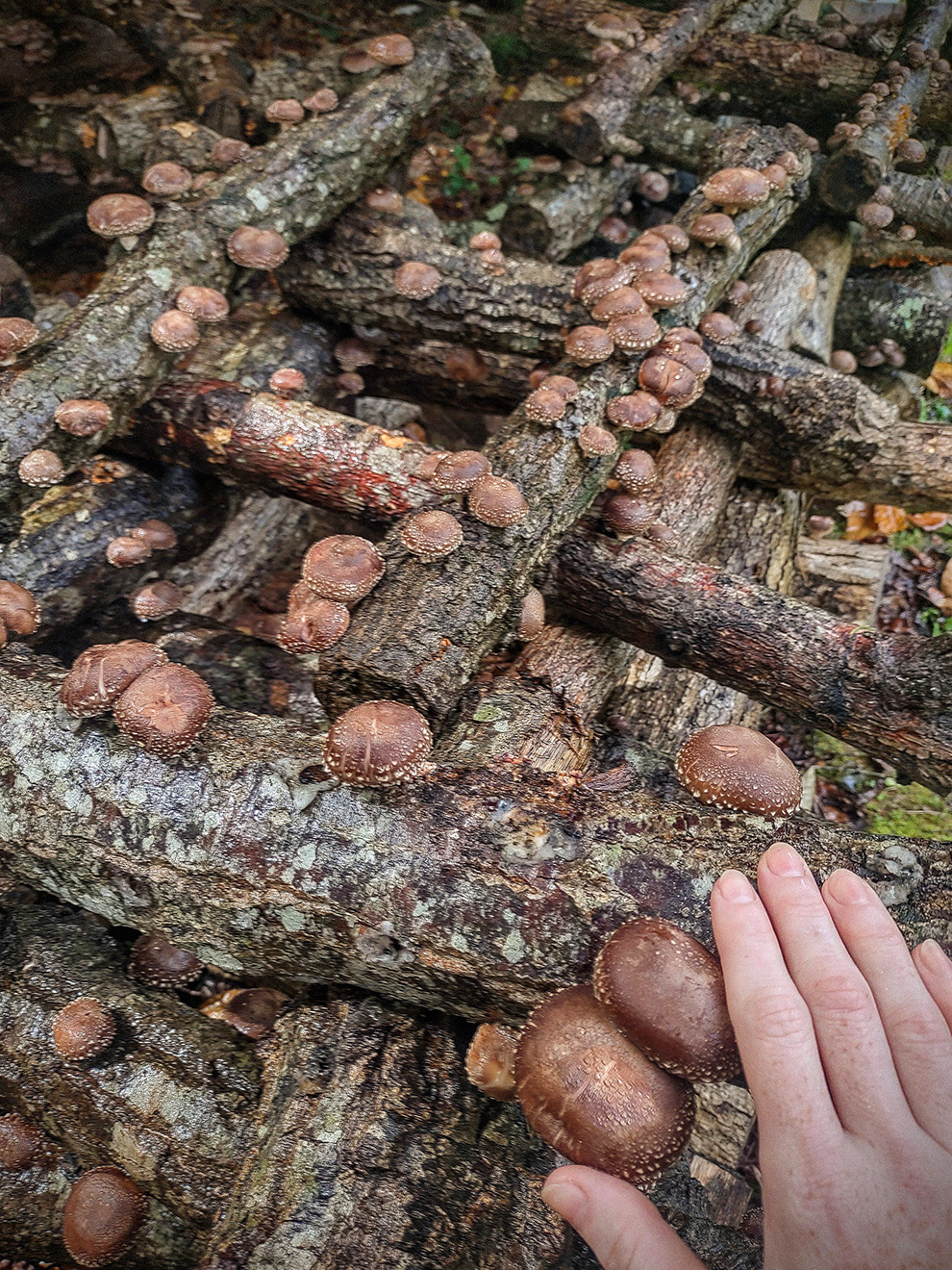
Finally, thank you for your time today and for sharing your knowledge and your vision for Resting Point Farms. How can readers learn more about your project and perhaps even get involved?
The easiest way to learn more about Resting Point Farms is to visit our website at RestingPointFarms.com. There, you can view our offerings of classes and workshops, or start an internship. Feel free to email us with any questions at Outreach@restingpointfarms.com.
We are currently structured as an LLC., and with the help of Western Carolina University, are transitioning to a 503(c) non-profit. We focus on education, continuous care, and giving resources.
Thank you! Good luck to everyone with your mushroom logs!
Jesse and Dee
Thank you both for sharing your story and keep us posted on developments at Resting Point Farms!

Leave a Reply